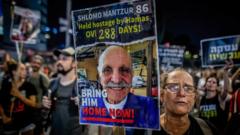Hamas has conducted a significant exchange by handing over four Israeli hostages' bodies in return for hundreds of Palestinian prisoners. The identities of the deceased—Shlomo Mansour (86), Ohad Yahalomi (50), Tsachi Idan (50), and Itzik Elgarat (69)—are currently being verified by Israeli authorities through DNA analysis following their abduction during the attacks on October 7, 2023.
On Thursday, Netanyahu's government initiated the release of over 600 Palestinian detainees, a move welcomed by jubilant crowds in the West Bank and Gaza, marking a remarkable atmosphere of relief and celebration. This swap represents the conclusion of the first phase of a ceasefire agreement, due to expire Saturday, with uncertainties surrounding a potential extension or progression to a subsequent phase involving the release of living hostages in exchange for further Palestinian prisoners.
Initial reports suggest that the returned remains are undergoing forensic testing closer to the Israel-Gaza border, though detailed outcomes are yet to be released. Previous exchanges have triggered controversy, as Israel criticized Hamas for disrespectful handover practices and for confusing one body with that of Shiri Bibas, leading to public outrage.
Family members of the four deceased hostages expressed their grief as they received the tragic news of their losses, signaling a somber moment amidst the ongoing conflict. Tsachi Idan's family, for example, articulated their heartbreak at learning he was no longer alive, while Itzik Elgarat was also recognized as a victim from a separate abduction incident.
The exchange has come against a backdrop of increasing tension surrounding the handling and treatment of hostages, alongside the tragic funerals of three hostages, including Shiri Bibas and her two young sons. Thousands participated in their funeral processions, underscoring the deep emotional impact of this conflict on families and communities.
As the clock ticks down to the ceasefire's conclusion, negotiations for the next phase—set to potentially cover the release of living hostages—are reportedly underway but still in a tentative state of readiness, with both sides cautious amid the grief and trauma that has defined this harrowing chapter in the ongoing Israeli-Hamas conflict.

















